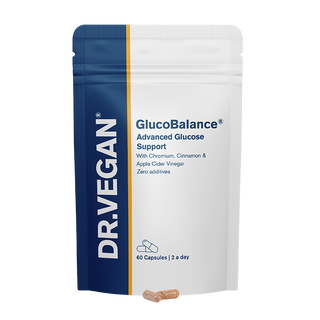Signs of high and low blood sugar

Awareness of the importance of blood sugar on our health and wellbeing has risen significantly, in part driven by the growth of blood glucose monitors that you put on your arm to monitor your body's response to the foods you eat. The more people that understand how to manage blood sugar to prevent conditions such as insulin resistance, is a very good thing. But do you really need an expensive monitor on your arm, or an overpriced monthly subscription to an app that tracks your blood sugar, when you can easily learn to recognise the symptoms and signs of high or low blood sugar, and adapt your diet accordingly?
Managing blood sugar levels is essential for short and long term health, from maintaining energy, brain function, mood and vital functions of your body, to avoiding type 2 diabetes and other serious health conditions. Our expert nutritionists explain the signs and symptoms of high and low blood sugar, what normal levels of blood sugar should be, and how to manage your blood sugar healthily through your diet and natural supplements. If you're wondering whether you should wear a blood glucose monitor, you may be interested in reading our article that delves deeper into the common questions about blood sugar levels.
What are blood sugar levels?
Blood sugar levels are the measurement of glucose in your blood, which is influenced by the foods you eat at every meal. Glucose is contained in the natural sugars and carbohydrates in all the foods we eat, from fruit, vegetables and legumes to whole grains, nuts, potatoes, and yes, chocolate. Our body releases insulin to breakdown the sugar and carbohydrates into glucose before it enters the blood stream through the intestinal wall. The glucose in our blood is then carried into our body's cells for daily energy production throughout our body and vital organs. Discover the best carbs for plant-based meals.
Create your free Diet Profile today
When blood sugar levels are tested, if they are showing as high, this is known as 'hyperglycemia', and may indicate insulin resistance or diabetes. Learn more from our nutritionists in 'What is insulin resistance'.
If blood sugar levels are low, this is known as 'hypoglycemia' and can be caused by a number of things, including not eating regularly, not eating enough, an increase in physical activity without an increase in calories, and alcohol consumption.
It is normal for your blood sugar levels to fluctuate up and down throughout the day, during and after meals, during and after exercise, and even through the night as you sleep. As a result, the use of Continuous Glucose Monitors (CGMs), which have become a recent trend fuelled by celebrity endorsements, can be unnecessarily alarming and paint a false picture of your daily and long term health. They also often over-claim about their benefits.
Are blood glucose and blood sugar levels the same thing?
Yes, blood sugar is another word for blood glucose. Sugars and carbohydrates in your food and drink are broken down in your gut and then enter the blood stream as glucose.
What is a normal blood sugar level?
Normal blood glucose levels range from between 4.0 to 5.4 mmol (millimol) per litre of blood when fasting, and up to 7.8 mmol per litre of blood two hours after a meal. If you're having your blood sugar levels tested, your doctor will perform something called a 'glucose tolerance test' which involves two blood tests, one after fasting, and one after the consumption of a sugary drink.
Manage your blood sugar levels with GlucoBalance®
In addition to focusing on a healthy balanced diet, and choosing the right foods to manage blood sugar that we explain below, if you are experiencing high blood sugar, then we recommend GlucoBalance®. GlucoBalance® is an advanced plant-based supplement developed by practitioners that manages blood glucose and your blood sugar metabolism, protecting against the highs and lows of blood sugar.
5 Common High Blood Sugar Symptoms
High blood sugar can present itself through a number of symptoms, however some people may not have any symptoms at all. If you are concerned, get your blood sugar levels checked by your GP.
1. Urinating frequently
As blood sugar levels rise, the body needs to excrete some of it though the kidneys. This causes a higher volume of urine to be made, and an excessive need to urinate. Learn more about the importance of checking your urine in 'What colour should your urine be?'.
2. Excessive thirst
Excessive thirst goes hand in hand with frequently urinating as a common sign of high blood sugar, and a common early sign of diabetes. Because the kidneys produce more urine to excrete the excess blood sugar, this in turn leads to regularly feeling thirsty.
3. Fatigue
Persistent tiredness and fatigue is a common symptom of high blood sugar and insulin resistance. When the body doesn't produce sufficient levels of insulin to breakdown the sugars and carbohydrates in your food and drink, the body isn't producing sufficient blood glucose for your energy, affecting all your body's vital organs.
4. Blurred vision
High blood sugar causes the lense of the eye to swell, which affects your vision and can make your vision blurry. The level of blood sugar that is required to affect your vision will vary before and after meals.
5. Skin discolouration or skin tags
With an increase in insulin levels in the blood, there is an increase in a hormone called 'insulin-like growth factor', which triggers the growth of skin tags, and dark, velvety patches of skin, especially in the armpits, neck and groin.
5 Common Low Blood Sugar Symptoms
As with high blood sugar symptoms, low blood sugar symptoms may not present themselves, however if they do it's likely to include at least one of these symptoms.
1. Tiredness
Tiredness may result if there is not enough glucose in the blood to get into the cells. Some people's body's adapt so that it can make energy out of fats via a process called 'ketosis', which can also be a warning sign of diabetes or a sign of diabetes getting out of control. The body can also make some glucose out of protein, in a lengthy biological process called 'gluconeogenesis'. Discover the best protein sources on a plant-based diet.
2. Dizziness
When your blood glucose levels are low, your brain tries to conserve energy which can leave you feeling light headed and dizzy.
3. Feeling hungry
Feeling hungry is a natural reaction to low blood glucose levels as the body tries to increase the levels of glucose in the blood. You may also be craving sweet or carbohydrate rich foods. This, unfortunately, often leads to people choosing sugary snacks and sweets, which is the worst thing you can do, because it only leads to a blood sugar spike before a sudden drop, starving the body of sustained energy.
If your blood sugar levels are well balanced, but you still find yourself lacking in energy, we recommend UltraEnergy, a high-strength B vitamin complex developed by practitioners for sustained energy.
4. Shaking or trembling
Low blood glucose levels create stress on the body. It triggers the release of the stress hormones, including cortisol, which may then cause tremors and shaking. Learn more in 'What is cortisol?' and 'Foods and vitamins to help relieve anxiety'.
5. Feeling irritable, anxious or moody
Feelings of anxiety, irritability or mood swings may come and go as a result of not enough insulin entering the brain. Insulin takes our happy hormone - serotonin - into the brain where it balances our mood and helps to relieve anxiety. If your brain isn't receiving serotonin via insulin, it can leave you feeling irritable, anxious and moody. Learn more in 'What supplements to take for brain health'.
Debloat & Detox

How to lower blood sugar levels naturally
Eating a healthy balanced diet combined with exercise and following these tips is the best starting for lowering blood sugar levels.
Protein with complex carbohydrates
Complex carbohydrates include whole grains, whole-wheat bread, potatoes, quinoa, beans, oatmeal and many vegetables. They all provide healthy, slow releasing sugars. When you eat protein with healthy complex carbohydrates, the protein slows down the release of the healthy sugars and helps limit the spike of blood sugar in your body.
Avoid refined sugars and sweeteners
Refined sugars are just bad. And both plant and artificial sweeteners are just as bad for you, as recently confirmed by the World Health Organisation. Whether it's powder supplements, processed foods, cookies, cakes, many pastas, sports drinks, many salad dressings, cereals, sauces, or yogurts, these foods and drinks commonly include refined sugars or sweeteners that cause a spike in blood sugar and can lead to insulin resistance. Learn more about the dangers of ultra-processed foods and how to avoid them. Remember, just because a powder supplement says on the pack no 'artificial sweeteners' doesn't mean it doesn't contain sweeteners - check the label because it may very likely contain plant-sweeteners which are just as bad for your long term health.
Cinnamon tea
Cinnamon has been studied for centuries and in particular in Ayurvedic and Chinese remedies to help maintain healthy blood sugar levels, normal blood sugar levels and stimulating your appetite. Cinnamon tea tastes great as it tastes sweet and hydrates you.
Water!
Don't underestimate the power of water! Water is one of the best drinks for us - it has no calories, no sugar and often, when people think they're hungry they are actually thirsty. Before reaching for the snacks, have a glass of water, wait a few minutes and then check if you really need those snacks!
Exercise
Exercise is an essential part of lowering blood glucose levels. The body uses the excess glucose to power the body, ultimately lowering blood glucose levels.
Vegan Omega 3

How to increase blood sugar levels
Eat every 2.5-3 hours
Eating regularly ensures a constant supply of glucose for the blood. Eat complex carbohydrates and protein as this combination ensures a steady release of glucose.
Avoid the highs and lows
Avoid sugar highs, as these highs then create sugar dips. Eat sensibly and frequently to ensure you are not peaking or dipping.
Eat healthy, calorie dense foods
Healthy, calorie-dense foods such as nut and seed butters, olives and avocados are excellent foods to go along with complex carbohydrates. These foods slow down your digestion, which helps to ensure a steady supply of glucose into the blood, preventing dips.
Choose different carbs before exercise
If you experience low blood sugar levels during exercise, you may need to take some additional sugars. You will need around 30g of sugar per hour of endurance exercise. This is equivalent to 1 cup of apple juice which is quick to enter the blood stream, providing pretty instant energy for your physical activity.
You may also enjoy reading:
- Best foods for Type 2 diabetes
- Exposed: Plant-sweeteners and type 2 diabetes
- Does sperm impact the risk of diabetes?
- The link between yeast infections and diabetes
- Why the hype about Apple Cider Vinegar?
- Exploring the link between diabetes & early menopause
Discover GlucoBalance®, our advanced formula for managing blood sugar.
View our range of vegan vitamins and supplements.
Want to hear more from our nutritionists? Sign up to our free newsletter:



















